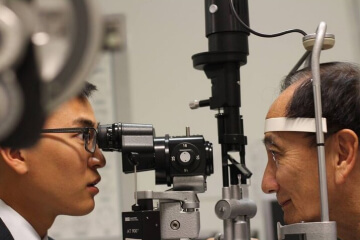
At Solar Eye Care, we believe that adequate time with the doctor and technology is key to providing the highest level of care. Our eye exams stand out because we invest in the latest imaging and diagnostic tools to ensure precise and thorough evaluations.
As a medical optometry practice, we recognize the importance of modern technology in detecting and monitoring eye diseases early on. Many eye conditions have no noticeable symptoms and can only be detected through advanced imaging and consistent monitoring over time.
Common Age-Related Eye Diseases
How Can I Prevent Eye Disease?
Routine eye exams are crucial—especially after age 65. Seniors should have annual eye exams, or more frequently if they have vision threatening conditions. Alberta Health covers most costs for senior exams with a $40 copay. Prevention, monitoring, and timely treatment are key to preserving lifelong vision.
Preventative Eye Care
We’ll discuss lifestyle and nutritional changes that lower the risk of diseases. With multiple forms of retinal imaging and digital records, we detect problems early and track even subtle changes over time earlier than ever before. At Solar Eye Care, we are committed to using the latest technology to ensure timely detection and effective treatment.
Presbyopia & Accommodative Fatigue
Frequent near work can cause blurry vision or eye strain. We’ll evaluate your near-focusing ability and recommend customized lens solutions to improve comfort and productivity.
Cataracts
Cataracts are inevitable with age. When glasses no longer provide clarity, we refer for surgery—a quick, effective procedure where the clouded lens is replaced with a clear implant. We guide you through all the lens implant options, including multifocal lenses for added visual range. We take care of pre and post surgical care at our clinic.
Glaucoma
Known as the “silent thief of sight,” glaucoma causes irreversible vision loss if not caught early. Due to being painless and slow, it is usually undetectable by the patient until blind. Regular exams with OCT and visual field testing help us detect glaucoma before vision is lost. Most cases are managed with eye drops, but advanced cases may need laser or surgery.
Macular Degeneration
Diabetic Retinopathy
Diabetes can damage your retina even before symptoms appear. Regular eye exams with retinal imaging detect early signs of diabetic eye disease. We can take care of monitoring mild and moderate cases, but if needed, we can refer you to a retina specialist for advanced treatments like injections or laser therapy.
What to Expect at Your Eye Exam
Pre-Exam Testing
Pretests: The Foundation of Accurate Results
Lensometry: Digital measurement of your current glasses to understand what you are used to.
Cornea and Glaucoma Screening: Eye pressure, corneal curvature, and thickness with a single automated device.
Retinal Imaging and Optomap: High-resolution and ultra-widefield scans to detect conditions like glaucoma, diabetic retinopathy, and retinal detachments.
Optical Coherence Tomography (OCT): Used when needed for 3D imaging of the retina, optic nerve, or cornea.
Peripheral Vision Testing: Used when needed to assess for glaucoma, stroke, brain tumors, or licensing requirements.
During Your Appointment
Doctor of Optometry Exam – Thorough & Tailored
- Discussion of your visual concerns and comfort
- Review of personal and family medical history
- Review of pretest imaging results
- Brief neurological checks: pupils and eye movement
- Vision testing and precise prescription using digital phoropter
- Tailored recommendations for work, hobbies, and daily vision
- Front-of-eye health check (eyelids, lashes, cornea, lens, iris, tear film) using LED slit lamp
- Back-of-eye exam (optic nerve, macula, retina, blood vessels), with dilation if needed
- Education about findings and treatment plans for conditions like:
- Cataracts
- Glaucoma
- Dry eye disease
- Diabetic retinopathy
- Macular degeneration
- If needed:
- Additional tests (OCT or visual field)
- Referrals to specialists (ophthalmologists, endocrinologists, etc.)
- Medical letters for family doctors or other care providers
After Your Senior Eye Exam
- Receive a glasses/contact lens prescription, printed educational materials, invoice for insurance
- Visit Costco Optical for free contact lens fitting or browse their glasses selection
(or shop anywhere you like—there’s never any sales pressure here)
